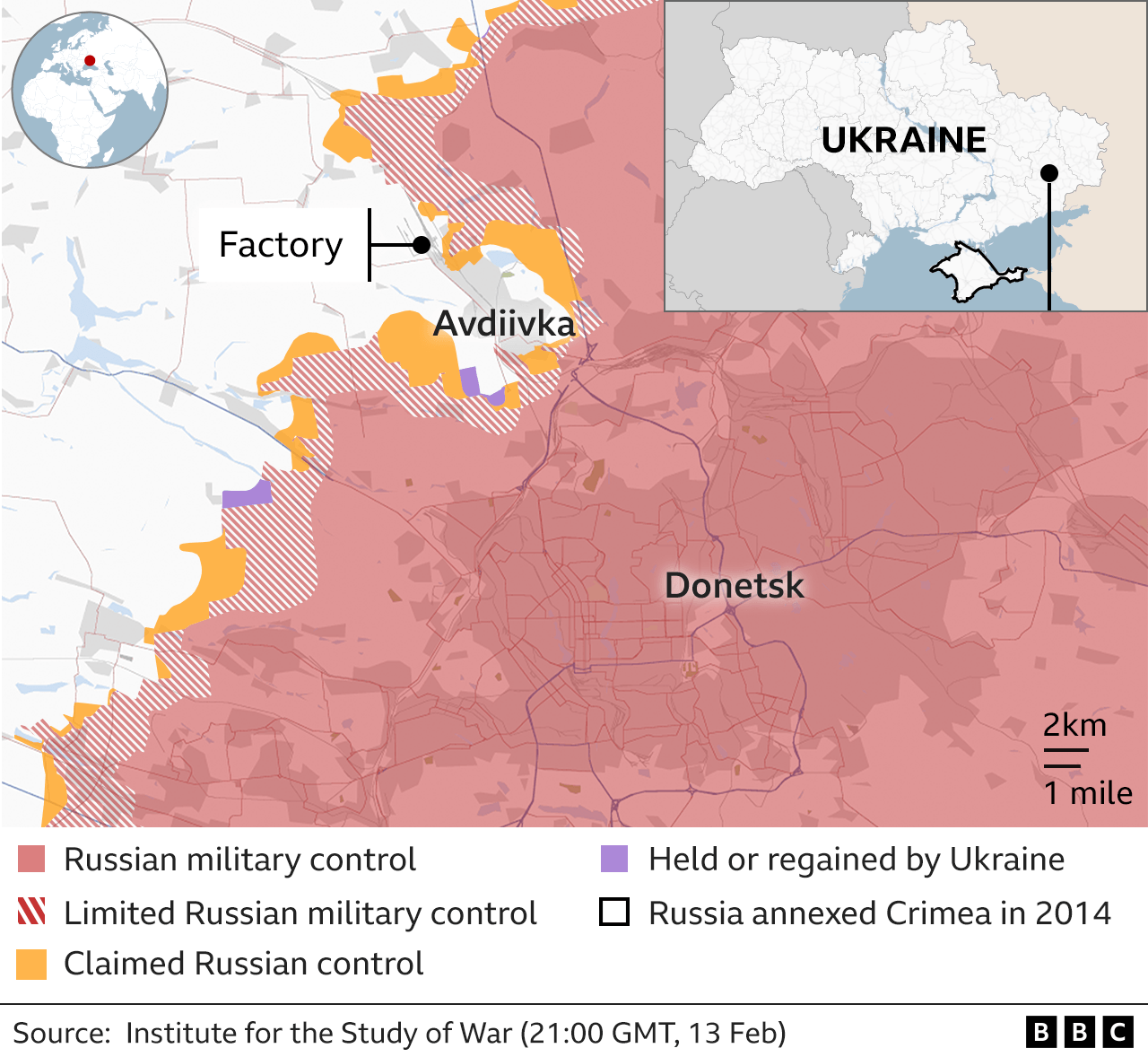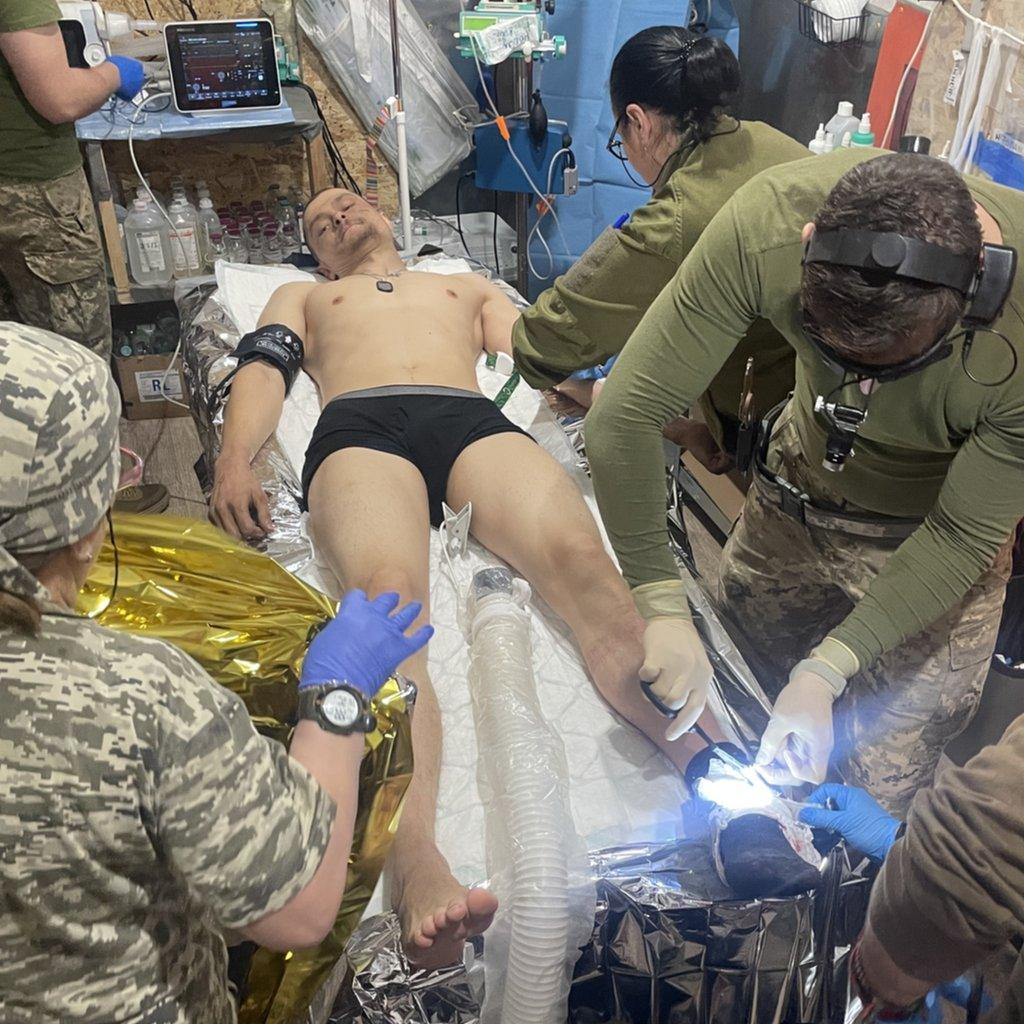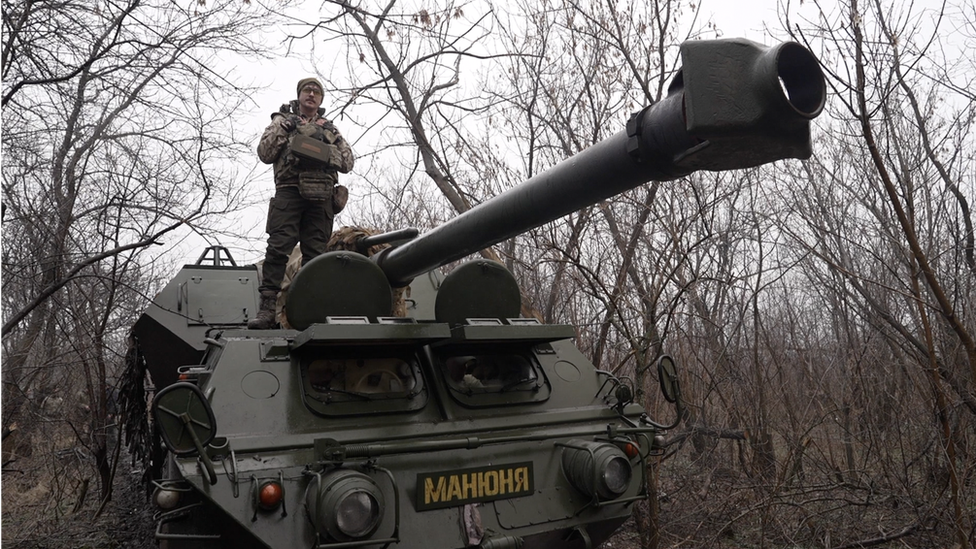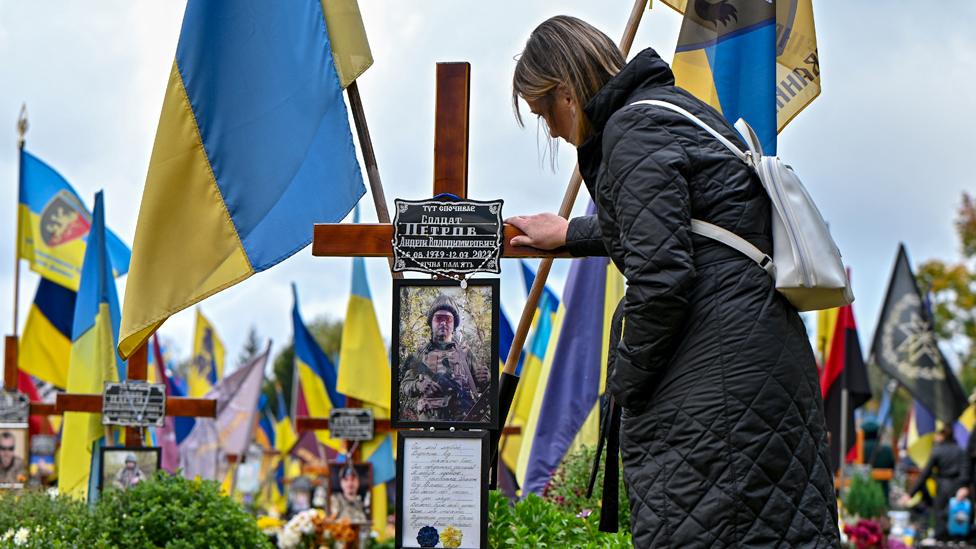Ukraine fights on in ruined Avdiivka despite severe weapons shortage
- Published
"I will die here": Evacuation "angels" help front-line town's last residents flee
Nato Secretary-General Jens Stoltenberg has warned that the US failure to approve continued military assistance to Ukraine is already having an impact on the battlefield, although he expects Congress will eventually approve an aid package. Republicans in the lower House of Representatives are holding up a $95bn (£75bn) foreign aid package for Kyiv.
Meanwhile, Russia has continued attacks on Ukrainian cities. After months of heavy fighting, Russian forces appear close to surrounding the ruins of Avdiivka, where frostbite is taking its toll on Ukrainian troops.
The man's fist looked unrecognisable. Like a split and bruised peach.
"Or like a rock," said the Ukrainian army surgeon, tapping the frozen fingers.
It was the second case of frostbite he'd treated that morning, standing beside a makeshift operating table, hidden inside an anonymous-looking cottage near the besieged ruins of the Ukrainian front-line town of Avdiivka.
"He'll probably lose both hands," said the surgeon with a frown.
It's very hard out there - we do not have enough of the weapons we need
As Russia's invasion edges towards the end of its second year, the mood among Ukraine's defenders is darkening, as exhaustion, frustration at a shortage of weapons, and the knowledge that there will be no quick military victory, all take their toll.
"My best friend was killed this morning," a bearded soldier shouted, along with a hail of swear words and a blast of cold air, as he barged through the back door into the 47th Brigade's well-hidden field hospital.
Moments later, two more wounded men were helped in through another entrance. Vadym, 48, had been hit by shrapnel in his upper arm that morning as his unit was storming a Russian position in Avdiivka.
"It's very hard out there," he said, as the surgeon, a senior lieutenant named Vitalii, came over to look at the wound and two army medics cut away Vadym's filthy uniform.
"We do not have enough of the weapons we need."

"It's difficult. The enemy has a lot of everything, of every type of equipment, while we have almost nothing," said the other wounded man, 24-year-old Andrii, before wincing in pain. A Russian artillery shell had hit his trench overnight and a piece of shrapnel had sliced through his ankle.
The surgeon, Vitalii, worked at a children's hospital before the war. He spoke wearily of his experience amputating limbs last year during Ukraine's failed counter-offensive across Russian minefields, and of the shrapnel wounds that were now filling his days and nights.

Andrii receives treatment for a shrapnel wound to his ankle
"I urge the West to be more decisive in assisting Ukraine, because (if they don't) sooner or later their soldiers will (also) have to fight against this evil that has invaded our country," he said.
Further north, two huge Ukrainian tanks roared along a mud-and-snow-smeared country road, then swung away through another heavily destroyed village and on towards the nearest Russian lines, perhaps 2km away.
After many months of fighting, the Kremlin's forces appear close to surrounding the ruins of Avdiivka, with some Ukrainian soldiers privately admitting the town, scene of some of the heaviest fighting of the war so far, could fall at any moment.
"We're upset," said a Ukrainian officer, Oleksii, from Ukraine's 110th Mechanised Brigade, standing beside a huge mobile artillery piece as the sound of Russian guns boomed in the distance.

Oleksii says he can no longer support Ukrainian infantry because of a lack of shells
The Czech-supplied artillery can hold and fire up to 36 shells at one time, and last year it was routinely shooting 80 shells a day at Russian positions around Avdiivka. But not today.
"Currently we have two shells, but we have no (explosive) charges for them… so we can't fire them. As of now, we have run out of shells," said Oleksii. He suggested that the shortages were widespread and having a dramatic impact on the fighting in Avdiivka.
"We feel a very strong responsibility for our guys fighting right now in the town, armed only with assault rifles." He compared the situation to early in 2022, when ammunition was also in short supply and he'd been wounded.
"I'm worried that there will now be the same large number of casualties that I saw in hospital then," said Oleksii.
Back in the field hospital, the two wounded men were now bandaged. The older man, Vadym, stood up, as if to leave, and argued that he was fit enough to return to his comrades in the trenches, but the doctor insisted he needed to wait at least a week.
Our fighters are determined to stand firm, but the conditions are extreme
The surgeon, Vitalii, scoffed at the idea that some Ukrainian soldiers might be deliberately getting frostbite wounds in order to avoid the hellish conditions on the front lines.
"That's absurd. You'd have to be a complete idiot. We don't have deserters like that, and I've never encountered a situation like that. On the contrary, our fighters are determined to stand firm," he said.
"But the conditions are extreme, and they have to sit in trenches without a stove in -15 or -20C, because any heat will be visible (to Russians) through thermal imaging devices."
Despite the difficulties around Avdiivka, there is no evidence yet that Russia is poised to make any broader, more substantial territorial gains.
After its failed counter-offensive, Ukraine is now preparing for a long defence of attrition, seeking to make Russia pay an even heavier price in men and machinery as the Kremlin tries to revive its stalled offensive in the Donbas.
But the longer-term prospects for Ukraine remain uncertain. It will need to find many more weapons and soldiers to have any chance of liberating territory in a conflict that looks set to drag on for some time.
Related topics
- Published14 February 2024

- Published10 February 2024
